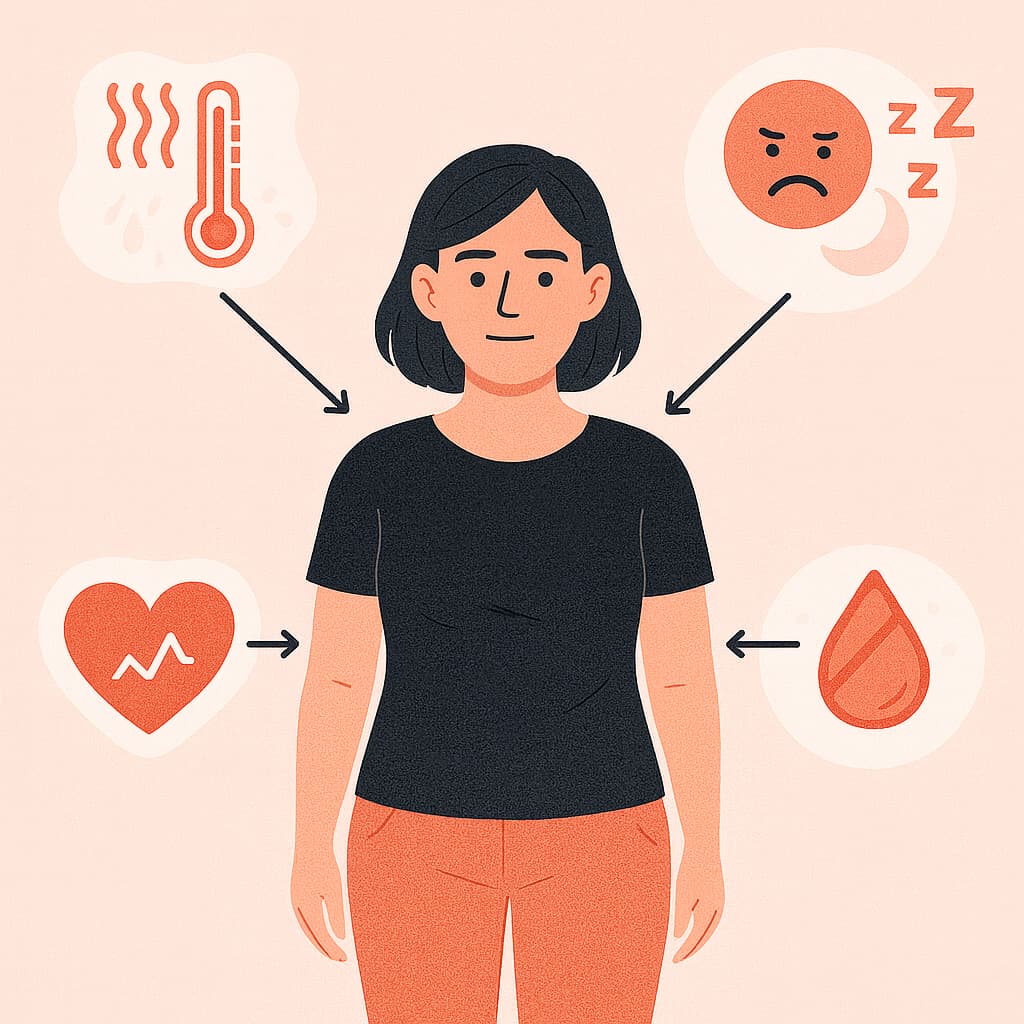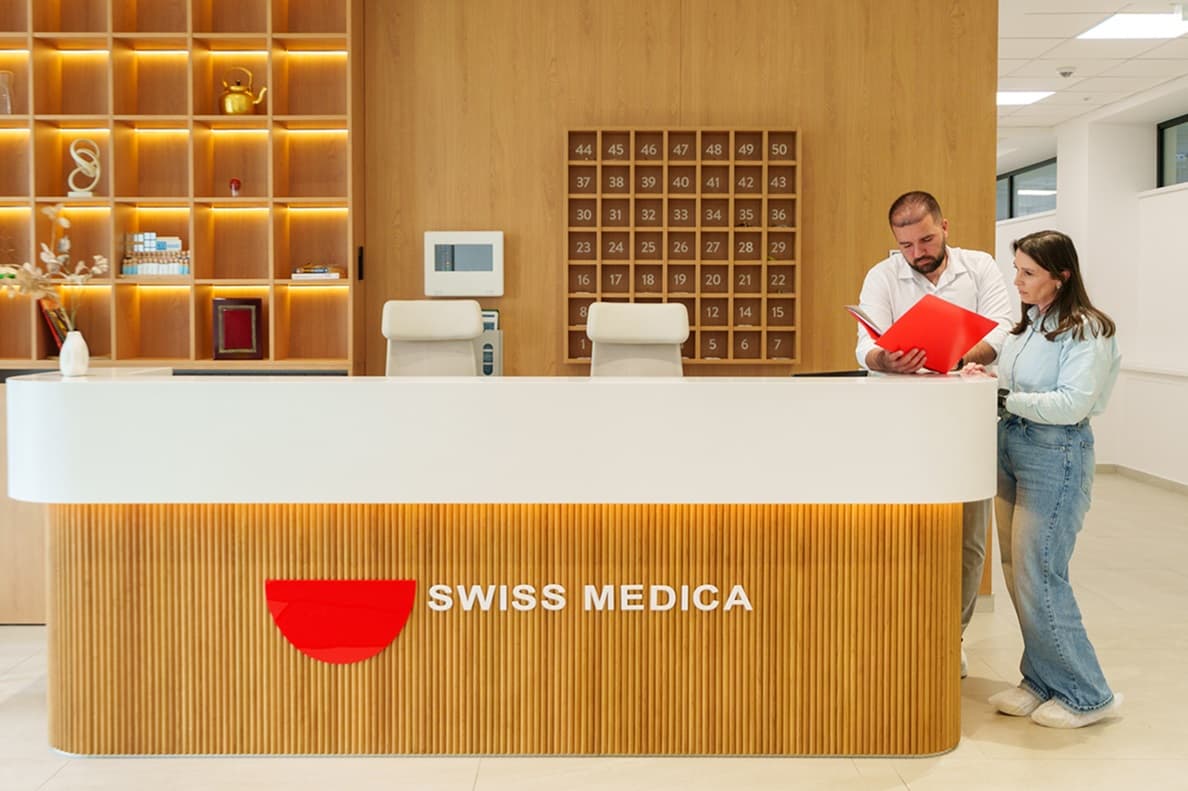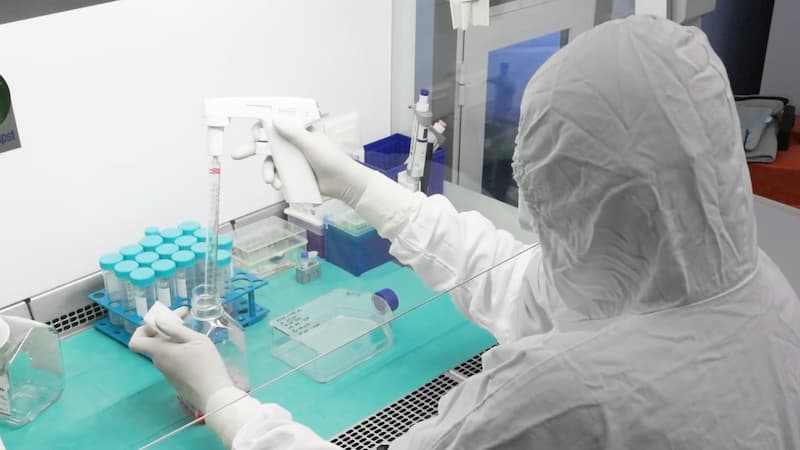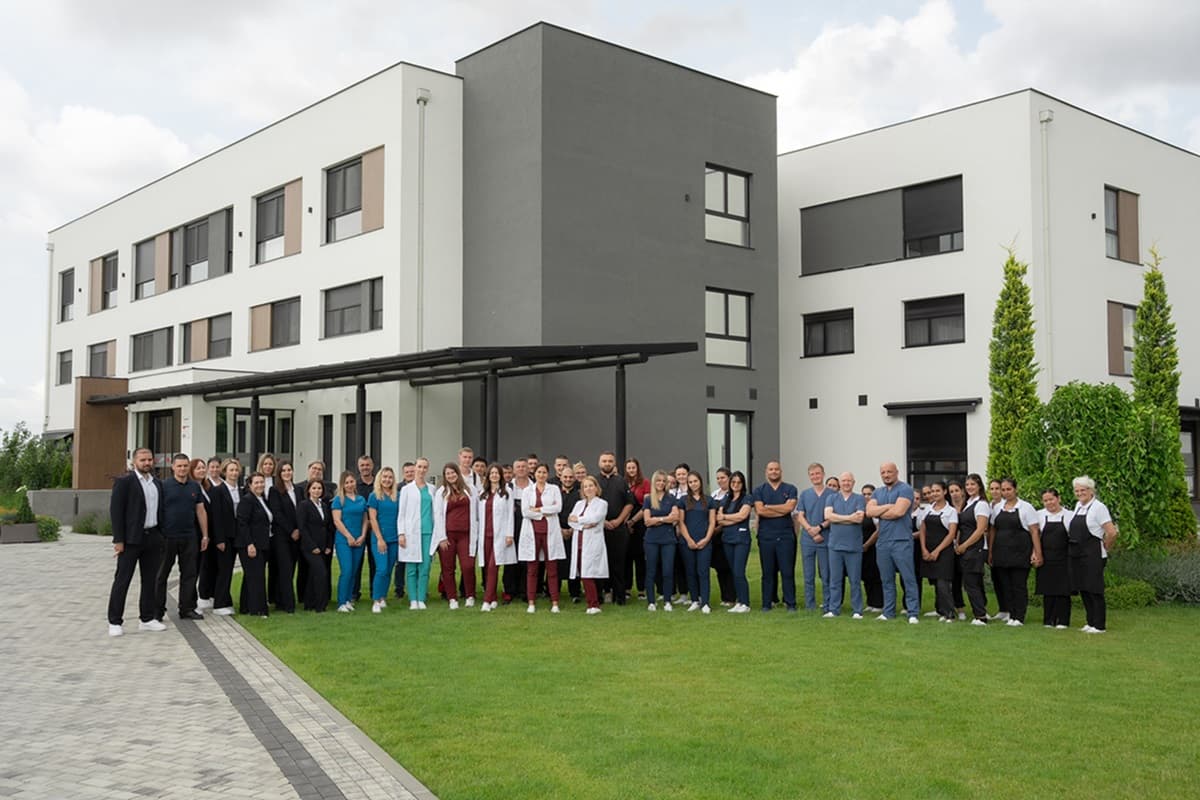Menopause marks a significant transition in a woman’s life, often accompanied by challenging symptoms such as hot flashes, sleep disturbances, mood changes, and bone fragility. While hormone replacement therapy has long been the standard approach, modern regenerative medicine now offers new options for maintaining hormonal balance and vitality.
One of these innovative approaches is stem cell therapy for menopause—and in this article, we’ll explain how it works and what it looks like at Swiss Medica.
Understanding Menopause and Modern Solutions
Menopause occurs when the ovaries significantly reduce hormone production, especially estrogen and progesterone.
Why Menopause Affects Women’s Health
Hormonal decline impacts many body systems, explaining why symptoms are not limited to reproductive health but also affect bones, the heart, the skin, and the cardiovascular and nervous systems. Women may experience:
- Vasomotor symptoms such as hot flashes and night sweats.
- Mood swings, irritability, and sleep difficulties.
- Cardiovascular changes, including increased blood pressure and cholesterol levels.
- Vaginal dryness and discomfort, leading to urogenital health issues.

Limitations of Traditional Hormone Replacement Therapy
Hormone Replacement Therapy (HRT) can quickly relieve many symptoms by directly supplementing estrogen and progesterone. However, long-term HRT use is linked with risks, including blood clots, stroke, and breast or endometrial cancer.
Regular monitoring is required, and not all women are candidates for HRT. This phenomenon has created a demand for alternatives that work through the body’s natural repair mechanisms instead of simply replacing hormones.
What is Stem Cell Therapy for Menopause?
Stem cell treatment for menopause uses mesenchymal stem cells (MSCs) and cell derivatives to promote tissue regeneration, improve endocrine function, and restore systemic balance.
Unlike HRT, this therapy does not “replace” hormones directly. Instead, it stimulates the ovaries, vascular system, bones, and immune system to recover their natural functions. This holistic approach is why regenerative medicine is increasingly considered a promising option for women seeking safe and long-lasting relief.
How Stem Cells Help in Menopause
Stem cell therapy takes a regenerative approach to menopause, aiming to restore balance by addressing the root causes of symptoms. However, every woman’s body responds differently, so the results depend on age, health condition, and individual response to treatment.
Mechanisms of Action of Stem Cell Therapy
MSCs and their exosomes release biologically active molecules such as growth factors, cytokines, and microRNAs. These signals promote tissue regeneration, improve circulation, and normalize metabolic processes. Their benefits extend across multiple systems:
General Anti-Aging Effects
MSCs stimulate angiogenesis, repair damaged cells, and promote collagen production. This helps improve skin elasticity, hydration, and overall vitality. Women often report a healthier appearance and more energy.
Influence on the Endocrine System
By stimulating ovarian tissue repair, MSCs can support residual hormone activity. This indirect effect contributes to restoring hormonal balance and alleviating many menopausal symptoms.
Immunomodulatory Effects
With the loss of estrogen, inflammation in the body often increases. MSCs help reduce chronic inflammation by suppressing pro-inflammatory cytokines (IL-6, TNF-α) and enhancing anti-inflammatory factors (IL-10, TGF-β). This effect is crucial for slowing aging processes and lowering the risk of chronic diseases.
Bone Health and Osteoporosis Prevention
Estrogen deficiency accelerates bone resorption, leading to osteoporosis and fractures. Stem cells promote bone regeneration (osteogenesis), helping maintain bone density and reducing fracture risk.
Nervous System Symptoms
Stem cell therapy can ease neurological manifestations such as hot flashes, night sweats, insomnia, irritability, and memory decline. It also contributes to reducing anxiety and depression by supporting neurotransmitter regulation.
Cardiovascular Benefits
Loss of estrogen increases risks of hypertension, atherosclerosis, and ischemic heart disease. MSCs improve endothelial function, stimulate new blood vessel growth, and help normalize lipid metabolism, contributing to cardiovascular protection.
Curious how mesenchymal stem cells actually work?
Discover how MSCs release growth factors and support natural regeneration in our article on mesenchymal stem cell therapy.
Clinical Effects and Long-Term Outcomes
Clinical experience demonstrates that stem cell treatment for menopause does more than relieve short-term discomfort. It helps re-establish systemic balance and slow down age-related decline. Instead of masking symptoms, stem cells support hormonal regulation and vascular and metabolic stability.
In women with hormonal imbalance or premature ovarian insufficiency, MSCs have shown the ability to stimulate ovarian tissue recovery and normalize endocrine communication between the ovaries, hypothalamus, and pituitary gland. This regenerative process contributes to sustained improvements in mood, energy, and general well-being long after the initial therapy.
Encouragingly, the long-term success rate of stem cell therapy for premature ovarian insufficiency shows that benefits can continue over time, with lasting improvements in ovarian function and health.
Overall, stem cell therapy for premature ovarian insufficiency and menopause represents a regenerative approach aimed at restoring the body’s self-regulating capacity, offering women a chance to age more slowly, feel stronger, and maintain hormonal balance naturally.
Get a free online consultation
Fill out the form for a free online consultation and discover how this treatment can make a difference for you.

Medical Advisor, Swiss Medica doctor
Safety, Possible Risks, and Effectiveness of Stem Cell Treatment for Menopause
At Swiss Medica, we use only adult mesenchymal stromal cells derived from the umbilical cord and placenta. These cells are ethically sourced, thoroughly tested for sterility and viability, and do not carry the risks associated with embryonic cells.
Is stem cell therapy really safe?
Discover how clinical research confirms the safety of mesenchymal stem cells and what strict quality controls we follow at Swiss Medica.
MSCs have strong immunomodulatory and anti-inflammatory effects and are known for their excellent safety profile. The treatment is performed in sterile conditions by licensed medical professionals. Temporary side effects such as mild fever, fatigue, or injection site redness may occasionally occur and typically resolve within hours.
To better understand the advantages of regenerative medicine, let’s compare the risks and effectiveness of traditional hormone replacement therapy and stem cell therapy for menopause.
| Aspect | Hormone Replacement Therapy | Mesenchymal Stem Cell Therapy |
| Mechanism of Action | Direct hormone replacement (estrogen ± progesterone) | Regenerative and modulatory: supports ovarian tissue, the immune system, and metabolism |
| Speed of Effect | Rapid relief (within weeks) | Gradual improvement (1–3 months) with long-term benefits |
| Duration | Works only during intake; symptoms return after discontinuation | Long-lasting effect through tissue regeneration; periodic boosters may be advised |
| Main Benefits | Quick symptom control; effective for hot flashes and mood swings | Systemic rejuvenation: skin, bones, joints, metabolism, and vascular health |
| Risks | Higher risk of thrombosis, stroke, breast and endometrial cancer | Minimal. Rarely, a slight increase in temperature and mild discomfort |
| Ideal Use | Short- to medium-term symptom relief | Long-term systemic recovery and prevention of aging-related decline |
While HRT remains an effective way to rapidly relieve menopausal symptoms, MSC therapy offers a deeper and longer-lasting restoration of the body’s natural balance, with fewer risks. In some cases, both approaches can be combined—HRT providing immediate symptom relief, and MSCs supporting long-term regeneration. As with any therapy, outcomes may vary depending on each patient’s age, overall health, and hormonal status.
Scientific Evidence and Clinical Research
Over the past decade, multiple studies have confirmed the potential of stem cell treatment for menopause to restore ovarian function and improve quality of life.
Clinical research indicates that MSCs can help regenerate ovarian tissue, normalize hormone levels, and reduce systemic inflammation.
Another clinical trial found that intraovarian injection of autologous stem cells led to a measurable increase in estradiol levels and follicle growth in early menopause. These outcomes are often described as ‘rejuvenation of premature ovarian failure with stem cells’, reflecting the therapy’s ability to naturally restore ovarian activity and hormone balance and highlighting its potential as a safe and effective regenerative approach for women experiencing menopause or early ovarian failure.
Is it Possible to Reverse Premature Ovarian Insufficiency with Stem Cell Therapy?
Premature ovarian insufficiency (POI)—sometimes referred to as early menopause—can occur before the age of 40 and is often associated with infertility, irregular menstruation, and severe menopausal symptoms. Current treatment options mainly focus on managing symptoms, but they do not restore ovarian function. Stem cell therapy for POI can help with this.
Clinical observations show partial recovery of menstrual cycles and increased hormone production in women after stem cell therapy for premature ovarian failure.
Although stem cell therapy for POI does not guarantee pregnancy, it has the potential to significantly improve hormonal balance and overall well-being.
Stem Cell Therapy for Menopause at Swiss Medica
At Swiss Medica, stem cell therapy for menopause is included in a customized anti-aging program aimed at fixing hormonal imbalances, reducing inflammation, and repairing tissue damage that happens during menopause. Each program is tailored individually after medical evaluation and includes cell therapy along with supportive treatments to maximize the outcome.
Who Can Benefit from Stem Cell Therapy for Menopause
This therapy is suitable for women who are experiencing symptoms of menopause or perimenopause—the period when hormonal fluctuations begin and early signs such as mood swings, sleep problems, and hot flashes appear.
Starting therapy during perimenopause can be especially effective, as the regenerative potential of the body remains high, and stem cells can help stabilize hormone levels before they drop drastically.
Women who can benefit include those who experience:
- Hot flashes, night sweats, and sleep disorders.
- Fatigue, anxiety, or mood swings.
- Vaginal dryness, discomfort, or low libido.
- Early signs of bone loss or joint stiffness.
- Cardiovascular or metabolic changes related to estrogen decline.
What to Expect During the Treatment Process
Before the procedure, the doctor performs a detailed consultation and reviews medical records to determine eligibility and the most effective treatment plan.
Types of Stem Cells Used in Stem Cell Treatment for Menopause
Swiss Medica uses adult mesenchymal stromal cells derived from umbilical cord and placental tissues—ethically sourced, thoroughly tested for sterility, and free of ethical or oncological risks. In certain cases, autologous cells (from the patient’s own fat or bone marrow) may be used, depending on individual health status.
These cells are known for their regenerative, anti-inflammatory, and immunomodulatory properties. They do not replace hormones directly but instead stimulate the recovery of ovarian tissue and support systemic balance.
Additional Procedures to Support the Effect of Stem Cell Therapy
Stem cell therapy for menopause is enhanced by supportive procedures included in Swiss Medica’s anti-aging program:
- Plasmapheresis—removes toxins and inflammatory factors from the bloodstream, improving the internal environment for stem cells.
- IMR Therapy (Intracellular Metabolism Recovery)—intravenous infusions of vitamins and antioxidants to restore metabolic balance.
- Physiotherapy (e.g., MBST, Spark/Shock)—stimulates tissue repair and supports muscle and bone strength.
- Exosome therapy—exosomes derived from MSCs extend the regenerative effects, providing continuous signaling even after the main course of cell therapy.
Patients’ Results with Swiss Medica: Lynn’s Story
Lynn came to Swiss Medica with a preventive goal: support hormone balance through menopause and age confidently. She had long worried about hair thinning (a family pattern) and occasional hot flashes. With a background in natural health, she preferred using her own stem cells and had previously tried PRP, laser, radiofrequency, and ultrasound.
“I stopped my menopause supplements on purpose to test the effect—and after the stem cell treatment, I haven’t had a single hot flash all week. No hormonal issues at all. That’s what makes it powerful: you help your body before anything breaks.”
Lynn also noted fresher-looking skin, steady energy, and an overall feeling of balance.
Watch her full story in the video, where she also shares how professional the team was and how comfortable she felt during her stay.
Combining Stem Cell Therapy with Lifestyle Support
To achieve the best long-term outcome, Swiss Medica doctors recommend combining regenerative treatment with lifestyle adjustments such as balanced nutrition, regular physical activity, and stress management. This helps maintain hormone balance and enhances the body’s natural regenerative capacity.
What Is the Cost of Stem Cell Therapy for Menopause?
Patients often ask, how much does stem cell therapy cost, and what exactly is included in the price? The cost of stem cell therapy depends on the patient’s condition, age, and the combination of procedures recommended by the doctor. Prices typically range between €7,000 and €25,000*, including medical examinations, stem cell injections, additional supportive therapies, accommodation, and post-treatment follow-up.
*Prices are indicative, based on January 2025, and may vary with condition severity and cell quantity required.
Why Choose Swiss Medica for Your Treatment?
Founded in Switzerland in 2011, Swiss Medica began as a research-driven medical center in the city of St. Gallen, dedicated to exploring innovative approaches in regenerative medicine. The name Swiss Medica reflects our origins—a commitment to precision, ethics, and scientific excellence that remains central to everything we do.
As regenerative medicine evolved, so did we. In 2016, our clinical operations relocated to Serbia, where a supportive regulatory environment and excellent infrastructure made it possible to expand and offer advanced mesenchymal stem cell therapy to international patients. This move allowed Swiss Medica to grow into one of Europe’s most experienced regenerative medicine centers, welcoming patients from more than 70 countries.
Our Belgrade Hospital—A New Chapter in Regenerative Medicine
In 2024, Swiss Medica opened a state-of-the-art hospital in Belgrade, now serving as our main headquarters.
Spanning 10,000 m² across five modern buildings, the hospital includes:
- a GMP-grade laboratory for stem cell production and quality control,
- an in-house cryobank for safe stem cell storage,
- five clinical departments specializing in regenerative, neurological, and metabolic conditions,
- 24/7 medical supervision and advanced rehabilitation facilities,
- comfortable patient rooms designed to feel like a home, not a hospital.
This expansion marks a new chapter in our mission—to make cutting-edge regenerative therapies accessible, safe, and ethically sound for stem cell tourism.
Want to see where your treatment will take place?
Learn more about our new regenerative medicine hospital in Belgrade, featuring in-house laboratories, a cryobank, and modern patient suites.
Our Expertise and Philosophy
- 13+ years of experience in regenerative medicine and clinical research.
- 10,000+ patients treated with documented results in hormonal, autoimmune, and neurological conditions.
- 31+ biomedical products developed in-house, including cell-based and cell-free (exosome and secretome) therapies.
- Strict European quality standards, with all cell batches tested for viability, purity, and sterility.
- Multidisciplinary medical team of 250+ specialists: doctors, scientists, and rehabilitation experts.
- Comprehensive treatment programs, integrating stem cells with detox, physiotherapy, IMR therapy, and lifestyle support.
At Swiss Medica, stem cell therapy for menopause is more than a medical procedure—it’s a path to restoring balance, confidence, and vitality through the body’s own regenerative potential.
Contact Our Clinic for a Consultation
If you are considering stem cell therapy for premature ovarian failure or menopause, our doctors can assess your condition and explain whether this treatment is suitable for you.
During a free, no-obligation online consultation in our stem cell clinic, you will learn:
- how stem cell therapy can help relieve your symptoms,
- what kind of results you can expect,
- and which treatment plan best fits your health goals.
Contact us
At Swiss Medica, every patient receives personalized care—from detailed pre-treatment evaluation to post-therapy follow-up and long-term support.
Contact us today to begin your journey toward restored balance and well-being.

Medical Advisor, Swiss Medica doctor
FAQ
1. How long does it typically take to observe results from stem cell treatment for premature ovarian failure or menopause?
Most patients notice improvements within 1–3 months, with the best results appearing between 3–6 months after therapy. Effects may include better sleep, fewer hot flashes, improved mood, and increased energy.
2. Can stem cell therapy completely replace hormone replacement therapy (HRT)?
Not entirely. While HRT directly replaces hormones, stem cell therapy stimulates ovarian tissue regeneration and supports the body’s natural hormone production. The two methods can be combined for faster and more sustainable results.
3. Is stem cell treatment for menopause suitable for women with premature ovarian failure?
Yes. Research shows that stem cell treatment for premature ovarian failure can help restore hormone production, improve ovarian function, and reduce menopausal symptoms. MSCs support tissue regeneration and stimulate the ovaries’ natural activity, which may also benefit women with premature ovarian insufficiency or early menopause.
4. Can you reverse menopause with stem cells?
While menopause is a natural biological process that cannot be completely reversed, recent research suggests that it may be possible to reverse menopause with stem cells partially by restoring ovarian activity.
List of References:
Wang, Y., Yi, H. & Song, Y. The safety of MSC therapy over the past 15 years: a meta-analysis. Stem Cell Research & Therapy 12, 545 (2021). https://doi.org/10.1186/s13287-021-02609-x
Ding, C. et al. Mesenchymal Stem Cells in Premature Ovarian Insufficiency: Mechanisms and Prospects. Frontiers in Cell and Developmental Biology (2021). https://www.frontiersin.org/articles/10.3389/fcell.2021.718192/full
Zhao, Y. et al. Efficacy and safety of mesenchymal stem cell therapy for ovarian ageing in a mouse model. Stem Cell Research & Therapy (2024). https://stemcellres.biomedcentral.com/articles/10.1186/s13287-024-03698-0
Li, J. et al. Stem cell–based therapeutic potential in female ovarian aging and infertility. Journal of Ovarian Research (2024). https://ovarianresearch.biomedcentral.com/articles/10.1186/s13048-024-01492-3
Li H, Bai L. Advances in mesenchymal stem cell and exosome-based therapies for aging and age-related diseases. Stem Cell Res Ther. 2025 Jul 26;16(1):401. doi: 10.1186/s13287-025-04318-1. https://pmc.ncbi.nlm.nih.gov/articles/PMC12296599/
Lee DR, Lee JE. Preservation of ovarian function using human pluripotent stem cell-derived mesenchymal progenitor cells. Clin Exp Reprod Med. 2025 Mar;52(1):30-37. doi: 10.5653/cerm.2024.07003. https://pmc.ncbi.nlm.nih.gov/articles/PMC11900672/
Li H, Bai L. Advances in mesenchymal stem cell and exosome-based therapies for aging and age-related diseases. Stem Cell Res Ther. 2025 Jul 26;16(1):401. doi: 10.1186/s13287-025-04318-1. https://pmc.ncbi.nlm.nih.gov/articles/PMC12296599/#Abs1
Igboeli P, El Andaloussi A, Sheikh U, Takala H, ElSharoud A, McHugh A, Gavrilova-Jordan L, Levy S, Al-Hendy A. Intraovarian injection of autologous human mesenchymal stem cells increases estrogen production and reduces menopausal symptoms in women with premature ovarian failure: two case reports and a review of the literature. J Med Case Rep. 2020 Jul 18;14(1):108. doi: 10.1186/s13256-020-02426-5. https://pmc.ncbi.nlm.nih.gov/articles/PMC7368722/
MD, Pediatrician, Regenerative Medicine Specialist














